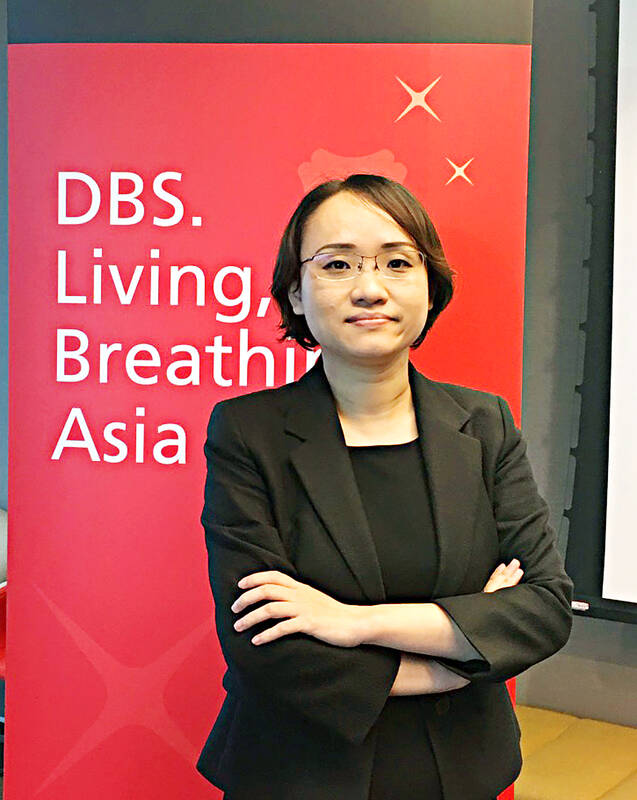Taiwan has increasingly shifted its investment focus away from China to the ASEAN and US markets, as major tech firms seek to improve supply chain resilience and diversify investment risks, DBS Group Holdings Ltd said in a report yesterday.
Taiwan’s tech sector would remain competitive globally over the next five years while increasing supply chain resilience ranks a top priority, Singapore-based DBS economist Ma Tieying (馬鐵英) said in the report.
ASEAN is set to become Taiwan’s largest foreign direct investment destination, after foreign direct investment in ASEAN member states totaled US$4 billion in the first 10 months of last year, Ma said.

Photo: CNA
It accounted for 32 percent of all outward foreign direct investment, a sharp increase from 14 percent before US-China trade tensions began in 2017, she said.
Hon Hai Precision Industry Co (鴻海精密), also known as Foxconn Technology Group (富士康科技集團) globally, and Pegatron Corp (和碩) have expanded investment in Vietnam and India to assemble smartphones, PCs, tablets and other electronics for their clients, notably Apple Inc, Ma said.
Contract chipmaker United Microelectronics Corp (UMC, 聯電) has also spent US$5 billion building a new 22 and 28-nanometer wafer fab in Singapore, she added.
The US is emerging as a major investment destination for Taiwanese companies.
Taiwan’s direct investment in the US exceeded US$8 billion in the past four years, nearly a fourfold increase from US$2.2 billion between 2013 and 2017, driven largely by investment in the semiconductor sector, Ma said.
Taiwan Semiconductor Manufacturing Co’s (台積電) first foundry in Arizona, which is under construction, is expected to start to producing 4-nanometer chips next year.
The world’s largest advanced chipmaker has said that it also plans to produce 3-nanometer chips at the Arizona fab by 2026.
At the same time, inbound foreign direct investment in Taiwan’s electricity and gas sector rose more than 10 times to US$1.5 billion over the first 10 months of last year, the report said.
Foreign direct investment from European countries increased nearly fourfold from a year earlier, with Denmark’s Orsted A/S, for instance, augmenting its investment in the wind farm projects in Changhua County, it said.
Taiwan’s green energy transition has begun to gain momentum, creating greater opportunities for foreign investors, the report said.
Electricity from renewable energy sources surged 36 percent year-on-year in the first 10 months of last year, making up 8 percent of all electricity supply, up from 6 percent a year earlier, it said.

In Italy’s storied gold-making hubs, jewelers are reworking their designs to trim gold content as they race to blunt the effect of record prices and appeal to shoppers watching their budgets. Gold prices hit a record high on Thursday, surging near US$5,600 an ounce, more than double a year ago as geopolitical concerns and jitters over trade pushed investors toward the safe-haven asset. The rally is putting undue pressure on small artisans as they face mounting demands from customers, including international brands, to produce cheaper items, from signature pieces to wedding rings, according to interviews with four independent jewelers in Italy’s main

Macronix International Co (旺宏), the world’s biggest NOR flash memory supplier, yesterday said it would spend NT$22 billion (US$699.1 million) on capacity expansion this year to increase its production of mid-to-low-density memory chips as the world’s major memorychip suppliers are phasing out the market. The company said its planned capital expenditures are about 11 times higher than the NT$1.8 billion it spent on new facilities and equipment last year. A majority of this year’s outlay would be allocated to step up capacity of multi-level cell (MLC) NAND flash memory chips, which are used in embedded multimedia cards (eMMC), a managed

Japanese Prime Minister Sanae Takaichi has talked up the benefits of a weaker yen in a campaign speech, adopting a tone at odds with her finance ministry, which has refused to rule out any options to counter excessive foreign exchange volatility. Takaichi later softened her stance, saying she did not have a preference for the yen’s direction. “People say the weak yen is bad right now, but for export industries, it’s a major opportunity,” Takaichi said on Saturday at a rally for Liberal Democratic Party candidate Daishiro Yamagiwa in Kanagawa Prefecture ahead of a snap election on Sunday. “Whether it’s selling food or

In the wake of strong global demand for AI applications, Taiwan’s export-oriented economy accelerated with the composite index of economic indicators flashing the first “red” light in December for one year, indicating the economy is in booming mode, the National Development Council (NDC) said yesterday. Moreover, the index of leading indicators, which gauges the potential state of the economy over the next six months, also moved higher in December amid growing optimism over the outlook, the NDC said. In December, the index of economic indicators rose one point from a month earlier to 38, at the lower end of the “red” light.